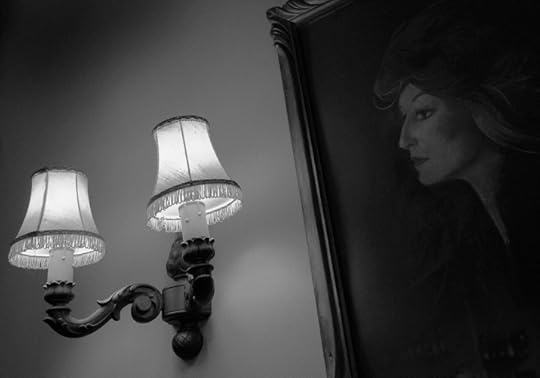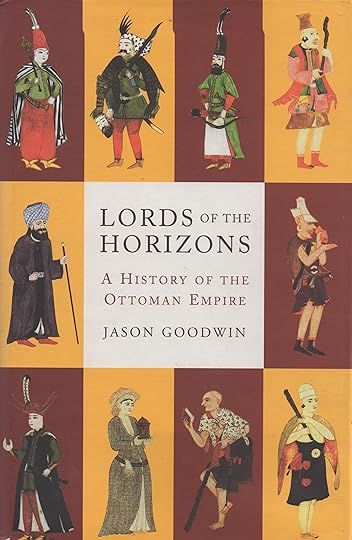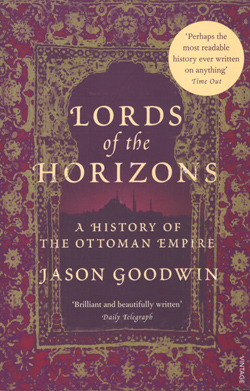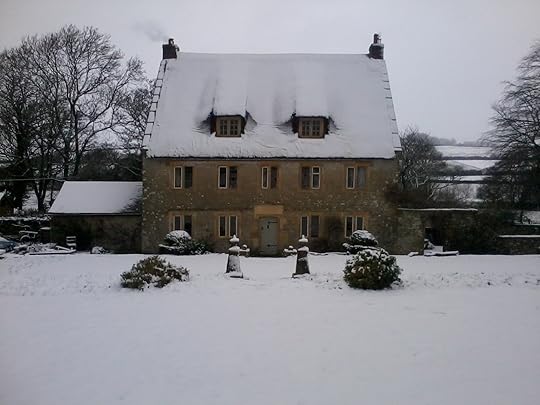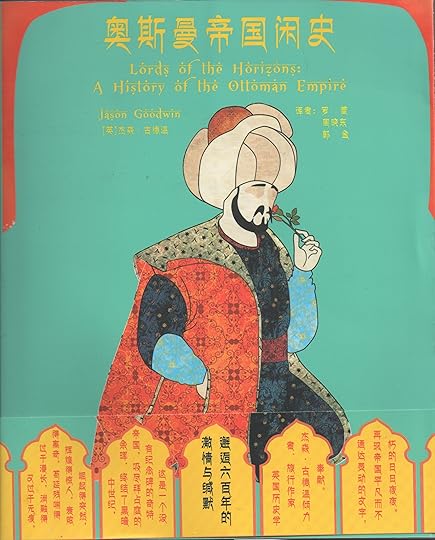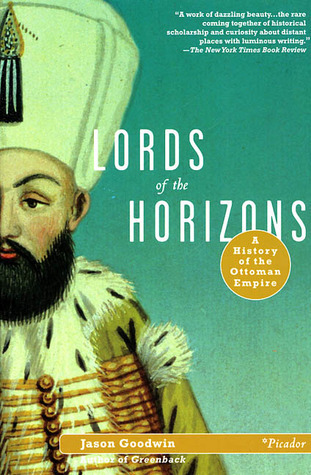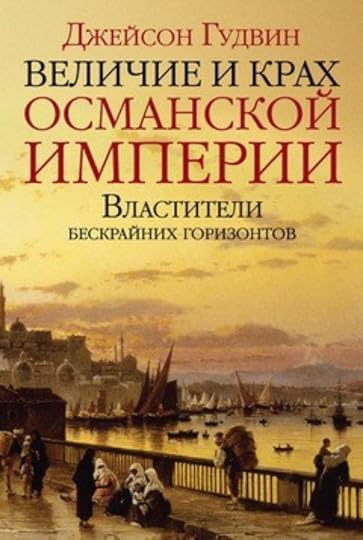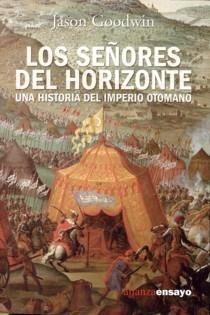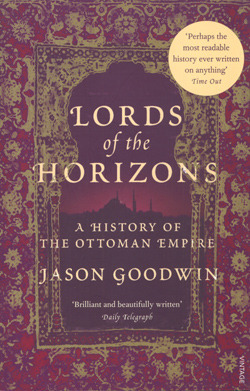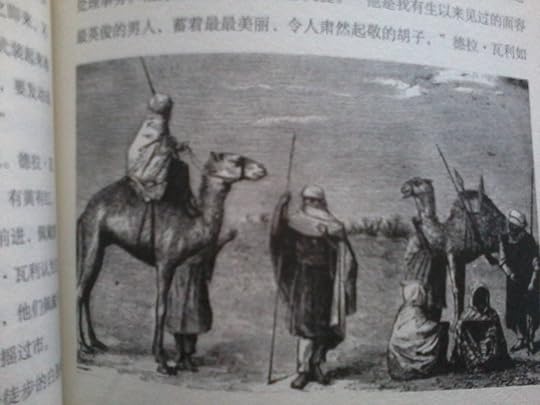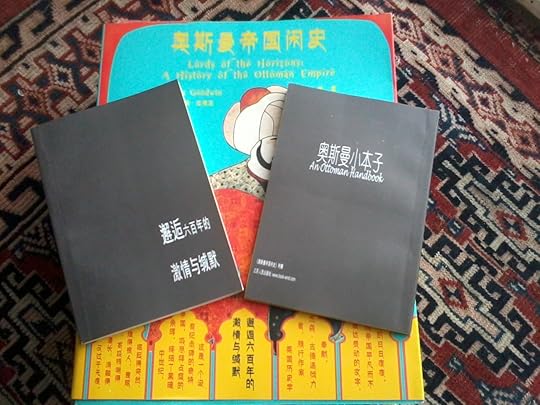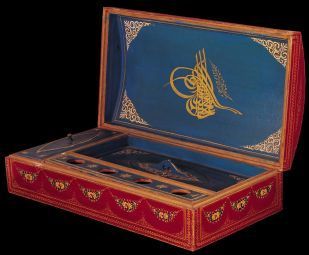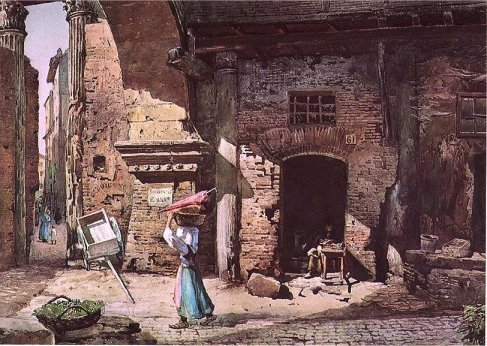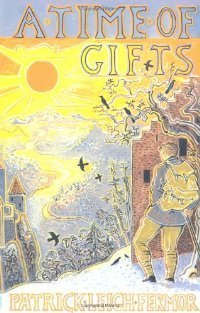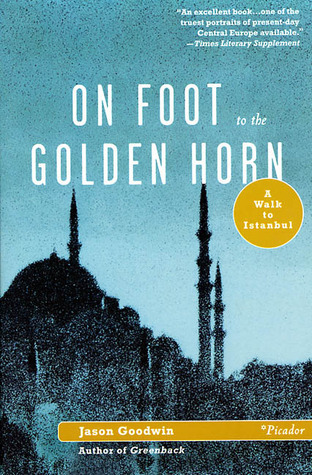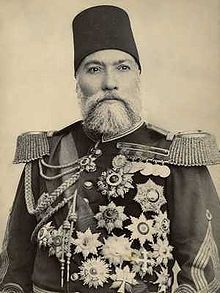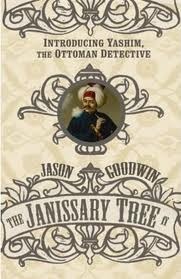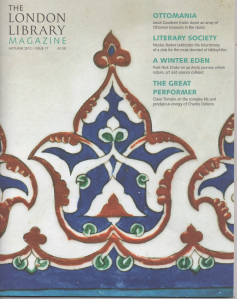Jason Goodwin's Blog: Talking Turkey, page 6
January 28, 2013
Lost Empires, Vanished Kingdoms
The historian Norman Davies has written a book after my own heart. Vanished Kingdoms details the stories of several significant European polities which no longer exist, including the Kingdoms, Duchies and Counties of Burgundy, the Polish-Lithianian Commonwealth, and Saxe-Coburg. The biggest recent Boojum is, of course, the Soviet Union, which vanished overnight without anyone – least of all Gorbachev – intending it to do so; nor the hundreds of thousands of soldiers, strategists, politicians or secret policemen devoted to its preservation, being able to do anything about it.
We tend to look at the history of existing things, rather than vanished ones; and the more eagerly when they are powerful existing things. And that brands us not only as creeps, but as fools: because the most interesting lessons of history, when you think about it, teach you how things fail and disappear.
My first published article was an essay on the Polish Government-in-Exile and the Estonian Consulate in London in the 1980s, both stubbornly defying the apparent verdict of history, which ruled that Poland was a communist satrap and Estonia a province. Happily it won me the Spectator/Telegraph Young Writer of the Year Award. Happier still, both the exiled government and the unconsular consulate – of a country which did not, officially, exist – were shortly to figure once again in their nations’ affairs.
I heartily recommend Vanished Kingdoms. And I offer my own contribution, in the prologue to my Ottoman history, Lords of the Horizons:
PROLOGUE
At the back of the Bayezit Mosque in Istanbul, close to the walls of the Grand Bazaar, stand the ruins of an old Byzantine chapel. Beneath its vaulted roof is a tumbledown cafe. Horn lanterns hanging from the wall cast a dim light on the clientele, while the open door affords a glimpse – beyond the gigantic cypress which grows in the courtyard of the Bayezit Mosque, past the porphyry columns – into the sanctuary of the mosque itself, where the faithful kneel in prayer.
In the cafe a little orchestra – flute, two drums, a viola and a triangle – is playing in one corner; a backlit sheet is stretched across another. Armchairs are taken by several elderly pashas, some in uniform, some in Stamboulines and fezzes, all of them supporting armfuls of grandchildren. Behind them sit a handful of solemn old men in turbans, smoking pipes; a clutch of Greek and Armenian women, swathed to invisibility in black shawls; and a couple of Cook’s tourists, in tweeds, hoping for an insight.
For in a moment Karagoz and Hacivat will skitter across the sheet, heroes of the shadow play, the Pantaloon and Harlequin of the Ottoman stage: jointed silhouettes, cut from dried camel leather, painted up and oiled for translucency. The original Karagoz, hunchbacked and foul-mouthed, and his straight man, Hacivat, are supposed to have developed their knockabout routines on a building site in 1396, where their antics proved so irresistible that work on Sultan Bayezit’s Great Mosque in Bursa ground to a halt, and the Sultan had them put to death. Others say Constantinople (Istanbul) always had its Karagoz and Hacivat, even in the days of the Roman emperors. Some think that the pair of them are offshoots of an ancient wisdom, dressed in a corrupted version of the licensed finery of the Sufi and the shaman and the bard.
In the semi-ruinous cafe they are worked by an Armenian, who is a mimic and comedian rolled up in a newspaper – a five-, six-, even seven-tasselled puppeteer. His is a very old, wandering profession. Over the years he has been in Hungary, setting garrisons in a roar, or in Egypt, raising a pasha’s smile; he has carried his cut-outs, lamp and little screen to Iraq and the Crimea; to the neighbourhood of Venice in the army’s van, and with the fleets to Algiers. The Cook’s tourists have been told to watch for his scurrilous take-off of a foreigner speaking Turkish. The orchestra wails and squeaks; the Armenian ladies giggle; the children squirm; and a constant supply of coffee cups moves about the room, borne by Circassian youths in ‘the good old costume’: which is baggy trousers, waistcoats, and coils of coloured linen piled on their shaven heads.
*
This book is about a people who do not exist. The word ‘Ottoman’ does not describe a place. Nobody nowadays speaks their language. Only a few professors can begin to understand their poetry – ‘We have no classics,’ snapped a Turkish poet in 1964 at a poetry symposium in Sofia, when asked to acquaint the group with examples of classical Ottoman verse.
For six hundred years the Ottoman Empire swelled and declined. It advanced from a dusty beylik in the foothills of Anatolia at the start of the fourteenth century to conquer the relics and successors of Byzantium,
including the entire Balkan peninsula from the Adriatic to the Black Sea, Greece, Serbia, Bulgaria, and the so-called Principalities of Wallachia and Moldavia north of the Danube. It took Anatolia. The submission of the Crimean Tartars in the fifteenth century, along with the capture of Constantinople in 1453, completed its control of the Black Sea. In 1517 it swept up the heartlands of Islam – Syria, Arabia, and Egypt, along with the Holy Cities of Mecca and Medina. Controlling the thoroughfares which linked Europe to the Middle East, the Ottoman Empire stretched from the Danube to the Nile.
The empire in those years was Islamic, martial, civilised and tolerant. To those who lived outside its boundaries, in lands known, by Islamic custom, as Dar ul-Harb, ‘Abode of War’, it was an irritant and a terror. To its own subject peoples, however, it belonged in the Dar ul-Islam, or ‘Abode of Peace’, and was such a prodigy of pep, so vigorous and so well-ordered, such a miracle of human ingenuity, that contemporaries felt it was helped into being by powers not quite human – diabolical or divine, depending on their point of view.
But at the start of the seventeenth century the Ottomans faltered. The Mediterranean Sea was relegated to second-division status, the Islamic spirit seemed to stagnate. The nations of the West were querulous and disunited, but their very squabbles proved vigorous and progressive. In the Ottoman, Islamic world the battles were already won, the arguments suppressed; the law was written, and the Ottomans cleaved ever more rigidly to the past in a spirit of narcissistic pride.
For the next three hundred years, the empire defied prognostications of its imminent collapse. Fractious and ramshackle, its politics riddled with corruption, its purposes furred by sloth, it was a miracle of a kind, too, a prodigy of decay. ‘It has become like an old body, crazed through with many vices, which remain when the youth and strength is decayed,’ wrote Sir Thomas Roe in 1621. The crazed old body survived him by almost three centuries; outlived its fiercest enemies, the Russian Tsar, and the Habsburg Emperor, by a full four years. Not until 1878 were the Ottomans dislodged from Bosnia; not until 1882 did the Sultan cease to rule, in title anyway, over Egypt. Albania, on the Adriatic coast, was one of the toughest provinces the Ottomans ever sought to subdue in the fifteenth century; but the Albanians were still sending parliamentary deputies to Constantinople in 1909.
This was an Islamic empire, though many of its subjects were not Muslim, and it made no effort to convert them. It controlled the thoroughfares between East and West, but it was not very interested in trade. It was, by common consent, a Turkish empire, but most of its dignitaries and officers, and its shock troops, too, were Balkan Slavs. Its ceremonial was Byzantine, its dignity Persian, its wealth Egyptian, its letters Arabic. The Ottomans were not accounted builders by contemporaries – even though one grim old Grand Vizier was remembered as the man who built more churches than Justinian. They came with no schemes of agricultural improvement, although production soared in the lands they conquered in Europe. They were not religious fanatics as a rule; Sunni Muslims, they followed the moderate Hanefi school of Koranic interpretation. Sultans read the life of Alexander, but they were not particularly interested in the past.[1] But the young Ivan the Terrible took the life of Mehmet the Conqueror as his primer, and the Venetians, who always liked to know the way things ran, fiercely admired the system of government which Mehmet had devised, and found in it a Palladian quality, of harmony and handsome proportion.
The empire outlived its grandeur, famously. By the time Napoleon landed in Egypt the empire seemed to the world as weak as Spain, as decayed in ancient pomp as Venice. Rich in talents still, the empire no longer provided a glittering stage for their expression. Its most brilliant sailors were all Greek. Its canniest merchants were Armenian. Its soldiers were ineptly led, while everywhere admired for their courage. Imperial statesmen operated at home in an atmosphere of intolerable suspicion. Yet the empire lingered into the twentieth century with no white cliffs to shield it, like England; no single language to unite it, like France. Unlike Spain, the empire was wedded to no illusions of religious purity; and it never discovered gold, or Atlantic trade, or steam. The Ottomans seemed to stand, in their final years, for negotiation over decision, for tradition over innovation, and for a dry understanding of the world’s ways over all that was thrusting and progressive about the western world.
Never, perhaps, did a power fall so low, in such a glare of publicity – the Crimean War of 1856, in which Turkey fought Russia with French and British aid, was the first war in history covered by journalists. Tsar Alexander called the Ottoman Empire ‘the Sick Man of Europe’. The Victorians referred to it impersonally as ‘the Eastern Question’, to which an answer, by implication, was to be supplied by muscular Christian gentlemen. To many westerners, of course, what was no longer an object of fear became an object of curiosity, and even admiration: certainly no one could deny the beauty of a traditional society, and painters found a ready market for their depictions of Levantine life. In the nineteenth century the empire made a valiant attempt to remodel itself along western lines, to enjoy, as everyone hoped, some of the western magic; but the convulsion killed it, for by then the heart was weak.
*
Karagoz is put in a coffin and buried at the end of the play, but just before the light goes out he pushes up the lid, hops out and sits on the coffin, roaring with laughter. The Armenian puppeteer puts out his lamp. The little orchestra, after a timpanic crescendo, lay down their instruments. The Circassian boys who have been handing refreshments round now pass amongst the audience for coins, and the pashas’ little girls, who have giggled through some improper dialogue, wriggle out.
The grave old master behind all the moves and bustle of that prodigious performance known as the Ottoman Empire moves on, packs up his puppets, extinguishes his lamp, and leaves only the screen behind: the hills, plains and declivities of the Balkans, the plateaux and coasts of Anatolia, the Holy Cities Mecca and Medina, the sands of Egypt, the grasslands of Hungary, and the grey, grey waters of the Bosphorus, which slap at the pilings of the Galata bridge.
[1] Posterity concerned them, of course. Abdi was Sultan Mehmet IV’s court historian (1648-87). ‘The Sultan kept him always near his person, and charged him with the special duty of writing the annals of his reign. One evening Mahomet [i.e. Mehmet] asked of him, “What hast thou written to-day?” Abdi incautiously answered that nothing sufficiently remarkable to write about had happened that day. The Sultan darted a hunting-spear at the unobservant companion of royalty, wounded him sharply, and exclaimed, “Now thou hast something to write about” ‘ (Creasy).


January 22, 2013
China publishing
Rain, falling on wet snow: a day of incipient gloom and indoor-ishness, with that sniffle making its way through each member of the family – towards me.
And then:
It is the Chinese edition of my Lords of the Horizons: A History of the Ottoman Empire.
It is also my favourite cover yet – gorgeous colour, great lettering.
Not only does it look like a product of the Silk Road – a bag of rice, perhaps, or a box of Turkish Delight – but it feels like one, too. The cover is smooth and quite thin, and the paper inside is Chinese, old-school, slightly rough, off-white.
The book itself is heavily and brilliantly illustrated, in black and white – and it comes with another little book, ‘An Ottoman Handbook’, with an illustrated glossary of Ottoman terms and practices. What a good idea! I wish we could have one of those in English.


January 14, 2013
Inspirations
The Ottoman world is such a visual feast that I almost wish we could have illustrated detective stories again… but here, instead, are a few things that have inspired The Latin Reader, which is out later this year.
This is a beautiful writing box, from the period. In The Latin Reader, the Valide (or Queen Mother) uses a box like this to write and store her private correspondence.
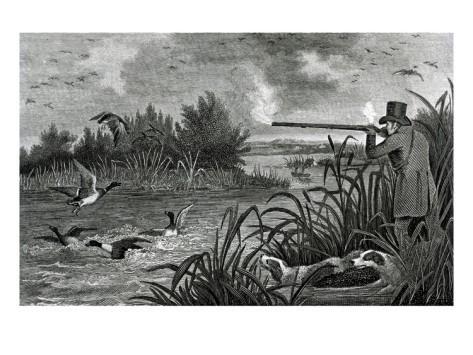 And this is a duck shoot, of course. When Polish ambassador Palewski finds a pair of good French fowling pieces in the Residency, he goes off in the very early morning to the lakes…
And this is a duck shoot, of course. When Polish ambassador Palewski finds a pair of good French fowling pieces in the Residency, he goes off in the very early morning to the lakes…
This is the Rome ghetto, where Jews were expected to live in the days when the Pope was a temporal as well as spiritual ruler.
Ottoman prisons were grim… this is Piranesi’s imaginative version.


December 5, 2012
Paddy and me
We met him for the first time in early 1990, just before we set out to walk from Poland to Istanbul. My aunt Judy asked him over for a drink. Impeccably dressed – touch of the dandy, old school, Guards… Shabby chic was not his style.
We told him our plan, to start walking from Gdansk. There was a cargo ship that made the passage to Gdansk from the Thames each fortnight, and offered berths. From the Baltic to Czestechowa, then Cracow, over Slovakia into Hungary…. It was a wonderful moment to start out across the lost lands of eastern Europe. Paddy had known them so well before the curtain dropped, and we would be among the first to go in again, to see how this disjointed Europe might re-unite. To see what and who was on the Other Side.
‘What a marvellous idea!’ he exclaimed, as if – well. As if we were the very first people ever to think of it.
The result was On Foot to the Golden Horn.
Funnily enough, today I dug up a letter from the father of an old friend: ‘I just wanted to say how enormously impressed I was by it, both as a record of an epic walk and as a book so full of insights and [points? punks?] as to put your competitors to shame. I enjoyed it from beginning to end. Thank you for it.’
Here’s the book in its e-book colours:


December 4, 2012
Patrick Leigh Fermor: An Adventure
Here’s my review of Artemis Cooper’s biography for Country Life Magazine.
In 1933 ‘a rather noisy boy’ with near-empty pockets and a head full of poetry set out from the Hook of Holland to walk to Constantinople. Paddy Leigh-Fermor was eighteen years old, fizzing with romance, curiosity and animal high spirits – eager, as his biographer explains, to step away from a fractured childhood, a chequered school career, and a remote suggestion from his even remoter father that he should try chartered accountancy if the army didn’t appeal.
As he tramped across the Low Countries and down through Germany to Bratislava, two letters of introduction hoisted Paddy out of the hedgerows and into a half-forgotten world of castles and old libraries. Margraves and counts cheerfully passed him along, with hunts, and gallops, and long nights talking by the fire, and friendships forged, in the Ruritanian twilight.
That world was swept apart by the war, and it would be forty four years before Paddy related the first part of his journey in A Time of Gifts, followed seven years later by Between the Woods and the Water. Artemis Cooper reveals what Paddy left out, changed, or never quite wrote – including his tumultuous love affair with a beautiful Romanian countess, and the final leg of the journey, which took him beyond Constantinople to Greece, the country that was to shape his life.
He was in Moldavia, and in love, when war broke out. Too wild and singularly gifted for a regular commission, he fetched up in occupied Crete, where in 1944 he carried out the daring kidnap of a German general, an exploit unpicked in one chapter of this biography; the story entered popular legend through the book Ill Met by Moonlight, written by his companion-in-arms Billy Moss; in the film Paddy was played by Dirk Bogarde.
Paddy’s own rich and energetic writing was an extension of the life, of a man who seized the world around him and shook it till it rattled. What dropped down in late nights and laughter, liquor and lovers, were the gems and diadems of his life and prose.
He had eight languages and friends in all of them, from Cretan shepherds to waitresses, Vlachs to Duchesses, gypsies and kuss-die-hand German aristocrats. Some friends were lovers: horrid old Somerset Maugham, brooding on some perceived slight, defined Paddy as a middle class gigolo to upper class women, a mean twist on Paddy’s cheerfully seductive generosity. ‘Most men are just take, take, take – but with Paddy it’s give, give, give,’ said Ricki Houston.
They could be generous in return – above all Joan Rayner, his lover and amanuensis, whom he married in 1968 (‘I don’t believe in long engagements’, he remarked; they’d been on and off since the War). Maurice Cardiff was astonished when Joan dropped money on the table at a Nicosia café, ‘enough if you want to find a girl.’
The books came slowly, growing through layers and revisions inspired, perhaps, by a 3000-word magazine commission: Paddy drove editors crazy. In The Traveller’s Tree, P L-F anatomised the islands of the Caribbean; A Time to Keep Silence explored the monastic world, through which he often derived peace and solace; but it was with Mani and Roumeli, in a projected series that would cover the whole of Greece, that his intense and multi-layered fusions of style and passions emerged at their fullest extent.
The style – turreted like Guelf fortifications, bristling with knowledge, speculation, humour and keen observation – was the fruit of deep learning, which he wore lightly and absorbed freely, with dazzling leaps of imagination. His verbal dexterity sprang from a mind filled with ‘poems and songs, puns and riddles, limericks, sonnets, lists of hats and stars, and verses by the yard.’ As his mother had translated ‘It’s a Long Way to Tipperary’ into Hindustani, so Paddy put ‘Widdecombe Fair’ into Italian.
Until Joan and he built a house at Kardamyli, on the Mani peninsula, in 1965, his abode was never fixed for long: a succession of places lent or rented as need arose – a castle outside Rome where the rats attacked the butter, a cottage in Devon, a Greek villa, a small hotel, an Irish house, palaces and hovels in Spain, France, but of course especially Greece.
For the wandering scholar Kardamyli was the answer. It contained what John Betjeman called ‘one of the rooms in the world,’ filled with books and stoked with friendships and drink, overlooking the sea. Everyone came, of course: Chelsea and Grub Street, toffs and dilettantes, drawn by Paddy’s gift for friendship and surprise; Bruce Chatwin moved in next door. Joan allowed stray cats to wander about ‘as free as air currents’: they ran their claws over the divans and Paddy found the right expression: he called them ‘born down-holsterers.’
Not everyone got it: some people resented his bumptiousness and ebullience, and he could have a tin ear for the mood at times, as Cooper tells us. But Paddy left most people feeling stronger (bar a hangover), their prose enriched, their humour and sense of wonder sharpened; and this marvellous biography, aptly named An Adventure, has the same tonic effect. Paddy’s exuberance could have overwhelmed his biographer, but whether describing a night attack on Crete, a love affair, or the political tensions over Cyprus that poisoned Anglo-Greek relations after the War, Cooper writes with a cool hand and clear head. Her book lives up to the majesty of the man, who died this year, at the age of 96.


November 12, 2012
Eat well, save money…read on!
If you use olive oil in the sort of quantity I use it, you’ll be pleased to know that my friend George Tsatsos has just launched an online olive oil delivery shop.
George’s background is in the cement industry, but he’s also a Greek who loves good food so I’m inclined to trust him when he says:
This is the result of our search for the best extra virgin olive oil in Greece, which brought us to the region of Ancient Epidavros, in the northern Peloponnese, where we now package olive oil on site at the olive press, ensuring that what we provide is in its purest form. We take great pride in the quality of our oil and hope to contribute towards making everyone’s food a bit more healthy and tasty. It has extremely low acidity (under 0,4% – Extra Virgin has to be under 0,8%).
I like to think of George’s search for the best oil and I rather wish I had been able to join him on it. Meanwhile, he is selling 3 litre cartons of the green gold for £29.99. The oil comes in a box which contains an aluminium-coated bag – like a wine box. Not as fun as a handsome tin but, I suppose, more practical.
Readers of this blog can get it for 10% less by using the promotional code P2755 at the website http://www.pelia.co.uk/
How, you ask, can you ever repay me for introducing you to such a wonderful extra virgin oil, with a discount thrown in? Well, now is as good a time as any to complete the set.

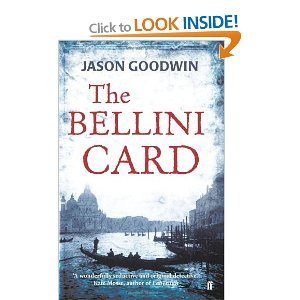
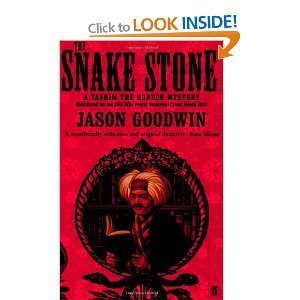
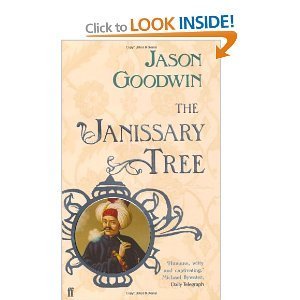
If you have all four Istanbul thrillers, don’t forget your friends this Christmas. And enjoy George’s olive oil!


October 16, 2012
On Foot to the Golden Horn
It’s rather strange to revisit a book after a long gap – especially one you’ve written yourself. Going through the proofs for the new Kindle edition, I couldn’t help making a few small edits; but I didn’t want to change much. The voice is the voice of my younger self.

When the book won the Mail on Sunday/JLR Prize – an annual award given to a writer under 35 – I received a cheque for £5000, a commission to write a travel piece for the Mail (I chose Venice) and a piece of advice from Bernice Rubens, who was on the judging panel. She suggested I should write fiction – not because I’d made things up, I hasten to add, but rather because the book read in many ways like a novel, with a novelistic sense of pattern and rhythm. It took a good ten years for me to take that advice.
The prize was awarded at a lunch at the Reform Club in Pall Mall, and at the end of the lunch I suddenly discovered that I’d lost the cheque. Panic! Eminent novelists searching under tables, poets turning out their pockets etc. It was a waiter who finally presented it back to me with a flourish: £5000 covered in coffee grounds and gravy where he’d fished it out of the bins.
Some episodes in the book are funny, some sad, some gloomy; and it’s perfectly un-PC. The TLS called it ‘one of the truest portraits of present-day Central Europe available’, and though so much has changed in these twenty years I think it does convey something of the atmosphere and history of those fascinating European hinterlands. I hope so, anyway.
Perhaps I’m proudest of the fact that it’s very different from The Gunpowder Gardens: Travels Through China and India in Search of Tea. Neither of these books were written for money or prizes, just out of curiosity and for the sheer pleasure of travelling and writing.


September 26, 2012
The Gunpowder Gardens redux
I’m due to speak next month at the Isle of Wight literary festival, and looking forward to chipping in on a discussion about the future of books, chaired by Michael Grade.
The link to the weekend’s starry line up of events is here:
http://isleofwightliteraryfestival.org/
I’m almost four months into my experiment with Argonaut Books, publishing the e-book version of The Gunpowder Gardens on Kindle, iPad and the Nook, and while it hasn’t allowed me to chuck writing and go fishing, the results have been pretty interesting.
In the first book I wrote, I was inspired by the tea caddies of my colonial grandmothers to explore the relics of colonial trade on the South China coast, the tea auctions of Calcutta and the tea gardens of the Himalayas. Shortlisted for the Thomas Cook Travel Book Award, The Gunpowder Gardens takes the reader on a journey through the tea lands of India and China, blending the history – and flavour – of tea with travel narrative.
With a cast of unexpected characters from Hong Kong’s Professor Tea to The Nose in Darjeeling, The Gunpowder Gardens is, in the words of The Sunday Times, ‘full of fascination’.
You can read some (genuine!) reviews on Amazon here:
The book sells a few more copies on Kindle every month, which is nice; and I did an impromptu giveaway last month, over a wet weekend, which led to almost 1500 Kindle users downloading it. That, I think, is like someone lending you a book they’ve enjoyed – why not?
The odd thing is that Kindle users seem enthusiastic – but it’s been pretty slow on the iPad, which is linked to the iTunes Store. I don’t know why that is.
Meanwhile, Artemis Cooper’s long-awaited biography of Patrick Leigh-Fermor is out next month, and to coincide with that Argonaut Books will publish my second book, On Foot to the Golden Horn: A Walk to Istanbul.
Two of Paddy’s travel masterpieces, A Time of Gifts, and Between the Woods and the Water, detail his own walk to Istanbul (which he always called Constantinople) in the mid-1930s. It was a moment before huge changes in eastern Europe swept away a whole world of wild Hungarian aristocrats, German nightclubs, retired scholars and families whose 16 quarterings gave them a place in the Almanack de Gotha, and those books are a wonderful evocation of that lost world.
My attempt to follow in his giant footsteps produced, as I see now, a different record of another, vanishing world: the near-mediaeval world of Europe’s last peasantry. In 1990, as the walls of communism were collapsing, most of eastern Europe was still inhabited and fed by small farmers and their families, holding a few acres and a few cows, ploughing with horses, sowing by hand – generous, warm-hearted people who were always prepared to give house-room (or a cosy barn full of straw) to a couple of hikers, making for a faraway city.
It’s a faintly elegiac book, though I had no idea how fast the changes might come; but it’s also, I’m happy to say, the record of an eccentric six-month courtship, on the road.


September 18, 2012
Posts of random satisfaction…
Here’s tonight’s supper – and the reason I’m excited is not, actually, because it’s beef and saffron and borlotti beans but because I’m within a few aces of completing Yashim’s latest adventure in The Latin Reader.
It’s rather like standing near the finishing line, jumping up and down as your horse appears down the final straight… Clues to hook up, scenes to be set, with character twists that even surprise me – and terrible decisions still to be made. All that before I go back and read it all through from the begining, a luxury I will not indulge while I write. In the meantime I have to get up now and then and do something else, like this.
Those beans are particularly beautiful and, like the chard, they will be planted in double quantities next year.
The saffron was an afterthought – it was just silverside, beans, onions, garlic, courgettes, carrots and marjoram, with a bayleaf. But I have just been thinking about a recipe my father got from La Pistollera, a Spanish Civil War fighter, who came once to our kitchen and cooked her calamari with saffron.
If food is not your bag, you may derive a random satisfaction this picture of Osman Pasha, an Ottoman general, instead:


September 17, 2012
The best new sleuth since Maigret
Disasters are said to come in threes, so maybe the same holds true of good things, too.
Last week, in The Week, A N Wilson chose The Janissary Tree as one of his six favourite books (between Wallace Stevens and St. Augustine’s Confessions). Wilson – whose new novel, The Potter’s Hand, is out this week – writes:
‘I am addicted to Goodwin’s detective stories set in in Istanbul in the 1840s. Yashim…is the best new sleuth since Maigret. The books evoke that great city and the plots are ingenious.’
Simultaneously I received my copy of the London Library magazine, with the cover story one I wrote about Ottomania, searching out the subject in the stacks of my favourite library.
On Monday I delivered a review of Otter Country by Miriam Darlington, to the Spectator, which came out on Friday.
Finally, our house was featured rather gorgeously in Ben Pentreath’s English Decoration, which is out next month – a copy arrived last week, too.
That’s four good things, you say? No, that’s one for my wife – revealing, as Ben writes, ‘the brilliance with which Kate puts together her rooms.’
Perfect!


Talking Turkey
I I'm drawn to Istanbul the way one is drawn to Dickens's London, or Chandler's LA: it is a riotous, burgeoning, creative city with stories round every corner. An atmosphere I try to catch in my books.
I'm an intermittent blogger but feel free to browse: there are essays on the city, on crime writing, on books, food, Polish freedom fighters, and history. ...more
- Jason Goodwin's profile
- 411 followers



